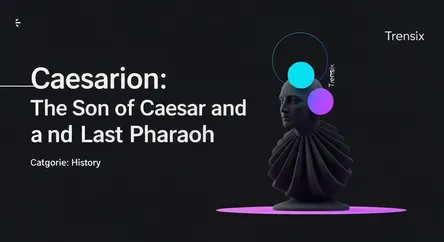History
Caesarion: The Son of Caesar and Last Pharaoh

The story of Caesarion, the son of Julius Caesar and Cleopatra, who was the last pharaoh of Egypt before its fall to Rome.
What is it?
Ptolemy XV Philopator Philometor Caesar, famously known as Caesarion or "Little Caesar," was the last pharaoh of Ancient Egypt. Born in 47 BCE, he was the eldest son of Cleopatra VII and the only known biological son of Roman dictator Julius Caesar. After Caesar's assassination in 44 BCE, Cleopatra returned to Egypt and named the three-year-old Caesarion her co-ruler. His lineage represented a potential union between Rome and Egypt, a fact his mother hoped would secure his future and the sovereignty of her kingdom.
Why is it trending?
Caesarion's story remains a fascinating chapter in history due to his legendary parentage and the dramatic power struggles of the era. His very existence posed a direct threat to Octavian (the future Emperor Augustus), who built his claim to power on being Caesar's adopted son and heir. Mark Antony's declaration of Caesarion as Caesar's true son and the "King of Kings" escalated tensions, leading to the final war of the Roman Republic. Caesarion symbolizes the end of an era—the demise of the Ptolemaic dynasty and the absorption of Egypt into the Roman Empire.
How does it affect people?
Caesarion's life and death underscore the brutal nature of Roman politics and the consolidation of power. His execution at age 17 by Octavian's order in 30 BCE was a calculated political move to eliminate any rival claimants to Caesar's legacy. This event cemented Octavian's control and paved the way for the Roman Empire. For history enthusiasts, Caesarion's story is a tragic tale of a young ruler caught between colossal figures, whose life and death marked the definitive end of Pharaonic rule in Egypt after three millennia.